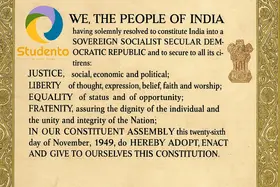

The Preamble of the Constitution of India stands as the philosophical foundation and visionary preface of the nation’s supreme law. Inspired by the American Constitution and rooted in Pandit Jawaharlal Nehru’s Objectives Resolution (1946), it defines the ideals of justice, liberty, equality, and fraternity. For students and aspirants of constitutional studies, understanding the Preamble is essential for interpreting the spirit and essence of Indian democracy.
It is not merely an introduction but a solemn declaration by the people of India, outlining the fundamental objectives and moral philosophy behind the nation’s governance framework.
The journey of the Preamble begins with the evolution of constitutional thought across the world and India’s own freedom struggle, which shaped its philosophical base.
The idea of including a Preamble was first seen in the American Constitution (1787). It served as a model that several nations, including India, later followed to express the spirit of their constitutions.
The 42nd Constitutional Amendment Act (1976) gave the Preamble a new dimension by incorporating the words “Socialist,” “Secular,” and “Integrity.” This amendment reflected India’s evolving social and political ethos.
The text of the Indian Preamble proclaims the resolve of the People of India to constitute a Sovereign, Socialist, Secular, Democratic Republic and secure justice, liberty, equality, and fraternity to all citizens.
Each term within the Preamble carries a deep moral and political meaning, defining the essence of the Indian state.
The Preamble was adopted on 26th November 1949, symbolizing the culmination of India’s constitutional journey and marking the birth of a sovereign republic.
The Preamble acts as both an introduction and a summary of the Constitution, offering insights into the values and objectives the framers envisioned for India.
It begins with the words “We, the People of India”, emphasizing that all constitutional power emanates from the citizens themselves, establishing India as a popular sovereign democracy.
The Preamble defines India as a Sovereign, Socialist, Secular, Democratic Republic, capturing the nation’s political philosophy and aspirations.
The Preamble lays down four chief objectives: Justice, Liberty, Equality, and Fraternity, forming the cornerstone of India’s democratic system.
The Preamble to the Constitution of India remains the heart and soul of the nation’s constitutional philosophy. It enshrines the core values of sovereignty, socialism, secularism, democracy, and republicanism. For students and aspirants, it serves as the key to understanding the moral compass guiding Indian governance. The ideals of justice, liberty, equality, and fraternity continue to shape India’s political, social, and legal frameworks.

Please login to comment and rate.